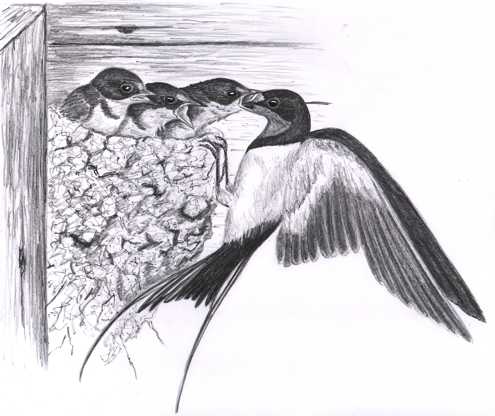
Dear Bird Folks:
For many years we have welcomed Barn Swallows to our small barn. We keep at least one door open for them to fly in and out of. They pay us back by eating untold numbers of flying insects. Then suddenly they are gone, leaving nothing but messy nests. Where do they go?
– Mert, Brewster.
Good For You Mert,
Good for you for keeping your barn door open for the swallows. It is hard to find a sweeter bird than a Barn Swallow, but you would not believe the number of complaints that I get about them. All spring I receive calls from whiners wondering how they can keep swallows “out” of their barn or shed. They moan, “The birds’ droppings are making a mess.” I reply “Dude, it’s a barn, not an operating room. Barns are supposed to be a little messy, that’s what makes them barns. Get over it.” I don’t have many friends.
Of the six species of swallows that we see around Cape Cod, the Barn Swallow is the one with the stereotypical swallow tail. It’s long forked tail gives the birds excellent maneuverability in flight and gives us an excellent field mark for identification. And like other swallows, the Barn Swallow has suffered from our love affair with pesticides. Yet, by incorporating many of our buildings into nesting colonies, they have also benefitted from us.
For the rest of us, who don’t have nesting Barn Swallows, let me explain a bit about their nests. The nest is a cup made up entirely of straw and delicious mud. When nest building swallows discover a mud puddle, a frenzy ensues, much like a bunch of Atkins freaks at a barbecue. The twittering swallows descend from all over, scooping up mud in their bills. Up to a thousand beak-fulls of mud may be needed to complete a nest, after which the swallows need to spend considerable time gargling and flossing.
It is thought that swallows spend more time on the wing than any other songbird, flying the equivalent of 600 miles a day searching for food. As their name indicates, upon finding food they swallow it. There is no biting, chewing or stashing it for later. The food instantly goes down the hatch and is forgotten about.
Unlike a bunch of deadbeat relatives, swallows are hardly freeloaders, they earn their keep. Swallows pay for their rental space by eating a huge amount of insects, including beetles, bees, flying ants, house flies and horse flies.
When food is plentiful, the young birds grow quickly and are out of the nest in about two weeks. It is their last few days in the nest that can cause the mess that freaks some people out. When the babies are small the parents carry away the droppings in neat packages called “fecal sacks”. But as the kids get older and stronger, they simply raise their bums up and over the rim of the nest and let it rip.
Unlike Tree Swallows that can survive on bayberries, Barn Swallows eat nearly 100% insects, so they need to be long gone before cold weather arrives. By the middle of August most Barn Swallows start to head out. Hundreds of them can be seen on power lines flocking up for the long migration. At sunset, huge flocks of swallows descend into nearby marshes to roost for the night. The sight of hundreds of birds diving into a marsh, lead early Europeans to think that swallows spent the winter buried in marsh mud. Pretty silly idea, but what else would you expect from the people who thought that the earth was flat and who drive Renaults?
At the first light of dawn the flock starts the long trip south. Covering several hundred miles a day, the swallows are focused on reaching their wintering grounds in South America. Some birds arrive via Mexico and Central America, while others island hop across the West Indies. The island hoppers have the shortest route but are also at the mercy of the weather. Storms, like the ones that have ravaged Florida this year, take a toll on migrating birds by battering them with wind, rain and flying mobil homes.
By the time you read this Mert your swallows will be well on their way to a winter of fun and sun in South America. I’m sorry to hear that they left your barn such a mess. If I were you I would withhold their security deposit. That will teach them.